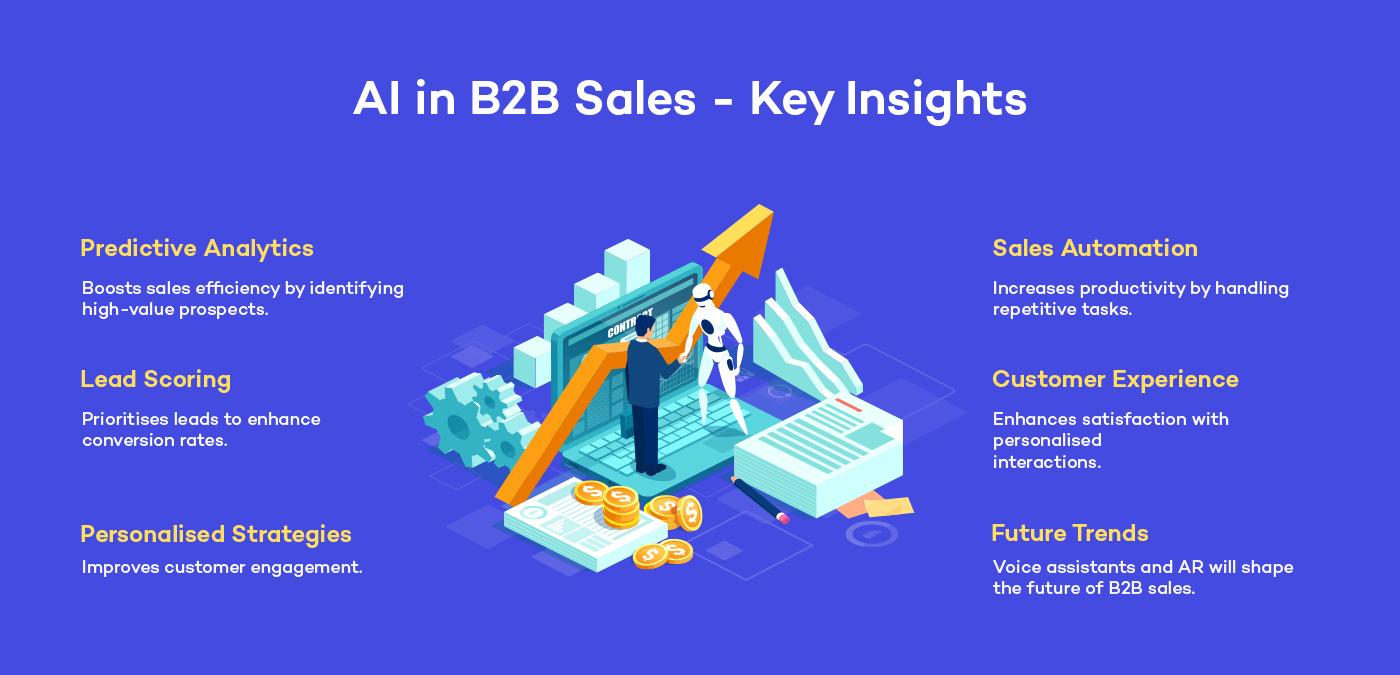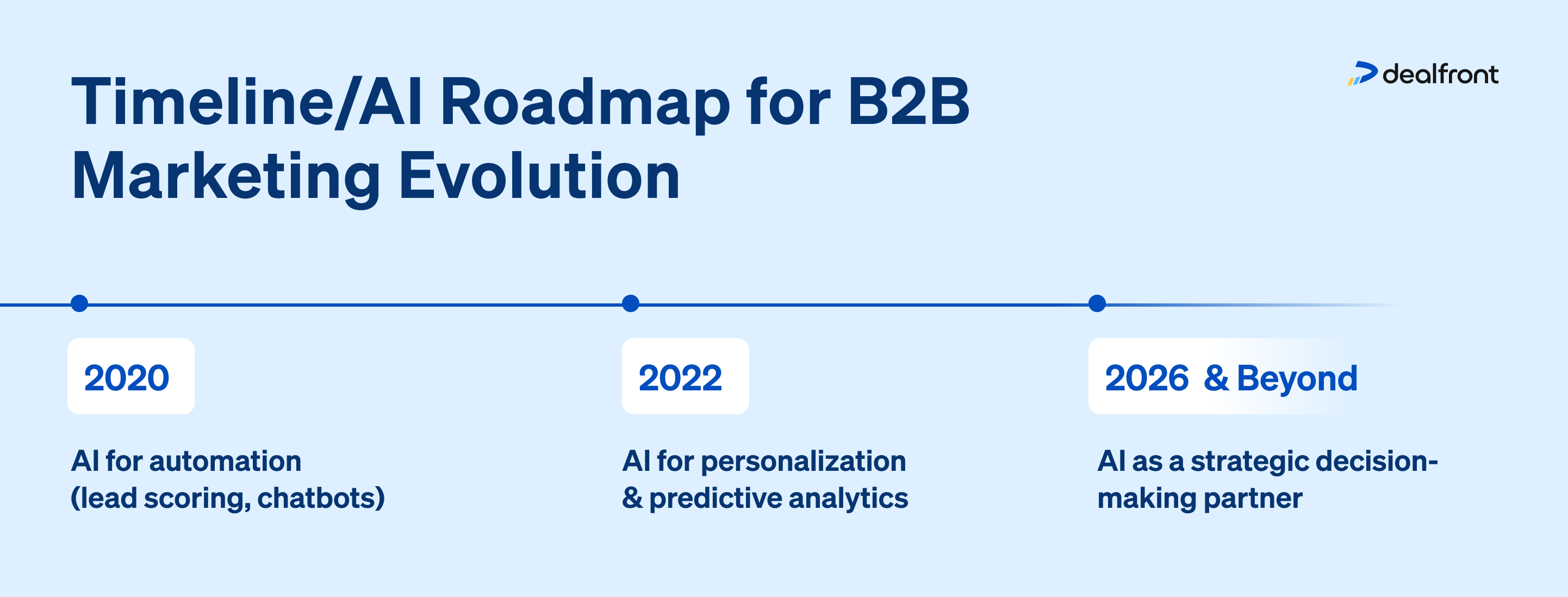Why AI Automation For B2B is key to agile business processes
Wiki Article
The Future of B2B: Utilizing AI Automation to Drive Success
The landscape of B2B is moving as business increasingly turn to AI automation for tactical advantage. This transformation assures to boost performance and client engagement through advanced modern technologies. The assimilation of these tools is not without its challenges. Comprehending exactly how services can browse this developing terrain will be vital for future success. What variables will establish the efficiency of AI in this field? The responses may redefine typical service models.Recognizing AI Automation in B2B
As services progressively look for effectiveness, understanding AI automation in B2B ends up being necessary. AI automation describes using expert system innovations to improve and boost service procedures. In the B2B market, this involves the combination of AI tools to handle jobs such as information analysis, customer communications, and supply chain operations. By leveraging artificial intelligence and all-natural language handling, firms can improve precision, lower human mistake, and speed up decision-making (Minarik AI). In addition, AI automation assists in the handling of large volumes of data, making it possible for companies to remove important understandings and optimize their operations. As companies browse this technical landscape, an extensive understanding of AI automation's abilities will certainly encourage them to remain receptive and affordable to market needsTrick Benefits of AI Automation for Companies
While numerous services face raising operational needs, AI automation presents numerous benefits that can significantly improve their efficiency. One substantial benefit is effectiveness; AI systems can do recurring jobs much faster and with better precision than human beings, therefore lowering mistakes and releasing up employees for more strategic campaigns. In addition, AI automation allows data-driven decision-making by examining large datasets rapidly, providing understandings that educate service techniques. Cost decrease is an additional crucial benefit, as automation minimizes labor prices and enhances resource allocation. AI can boost scalability, enabling businesses to adjust to market modifications swiftly. Inevitably, the combination of AI automation fosters technology, allowing companies to continue to be competitive in a swiftly progressing landscape.Transforming Consumer Experiences With AI
AI is reshaping consumer experiences by enhancing and making it possible for individualized interactions involvement. With the implementation of anticipating analytics, companies can prepare for client needs and choices, resulting in more customized solutions. Furthermore, streamlining assistance procedures with AI technology improves efficiency and complete satisfaction, ultimately changing the overall consumer trip.Personalized Communications and Interaction
Personalized communications have come to be a foundation of effective consumer interaction in the B2B landscape. By leveraging AI-driven services, organizations can customize their interaction and offerings to satisfy the distinct needs of each client. Automated systems evaluate client choices, behaviors, and data, making it possible for companies to produce tailored experiences that resonate with their target market. This degree of personalization not just improves consumer fulfillment yet also cultivates lasting commitment. In addition, AI devices facilitate real-time communications, allowing companies to respond quickly and efficiently to inquiries and feedback. Therefore, firms can construct stronger connections with clients, guaranteeing that their services straighten with advancing assumptions. Eventually, customized engagement via AI causes enhanced outcomes and sustained success in the affordable B2B market.Anticipating Analytics Execution
As organizations progressively look for to improve customer experiences, implementing anticipating analytics has emerged as a crucial technique in the B2B sector. By leveraging data-driven understandings, organizations can anticipate consumer requirements and preferences, enabling them to customize their offerings better. Predictive analytics utilizes innovative formulas and historical data to forecast future behaviors, enabling services to determine potential obstacles and opportunities. This aggressive technique not only improves customer complete satisfaction but also fosters commitment by providing appropriate and prompt remedies. In addition, predictive analytics assists in source allotment, guaranteeing that marketing efforts are concentrated on high-value potential customers. Eventually, the assimilation of anticipating analytics equips B2B companies with the devices needed to transform customer interactions and drive lasting success in a significantly affordable landscape.
Improving Assistance Processes
Enhancing consumer experiences in the B2B sector extends past anticipating analytics; enhancing support processes plays a crucial duty. By integrating AI-driven services, services can automate regular questions and improve reaction times, resulting in increased client contentment. Chatbots and digital aides supply 24/7 assistance, resolving customer requires promptly and decreasing the concern on human agents. This automation allows groups to concentrate on intricate concerns, promoting even more significant interactions. Moreover, AI devices can assess assistance data to identify fads and locations for enhancement, guaranteeing continuous improvement of solution high quality. As companies embrace these innovations, they position themselves as receptive and customer-centric, inevitably driving loyalty and organization development in an increasingly affordable landscape.Improving Procedures and Processes
Improving procedures and processes in B2B settings is vital for enhancing total efficiency. By maximizing workflow effectiveness and automating routine tasks, companies can decrease hand-operated errors and cost-free up important sources. This shift not just improves efficiency but likewise makes it possible for teams to concentrate on strategic efforts that drive development.Optimizing Process Performance
Optimizing process performance is essential for services looking for to reduce operational expenses and boost performance. By evaluating existing processes, companies can recognize traffic jams and redundancies that hinder performance. Carrying out structured treatments enhances communication and partnership amongst groups, ensuring that tasks are completed much more quickly. Making use of data-driven understandings makes it possible for companies to make informed decisions that fine-tune procedures better. In addition, adopting integrated innovations can assist in seamless info circulation, decreasing the risk of errors and delays. As businesses embrace these adjustments, they not just cultivate an extra agile workplace yet additionally place themselves to react promptly to market needs - Growth Systems For B2B. Ultimately, concentrating on workflow efficiency allows organizations to assign resources efficiently, driving long-lasting success in a progressively competitive landscapeAutomating Routine Tasks
Lots of companies are progressively turning to automation to handle regular jobs, acknowledging its potential to greatly boost functional effectiveness. By deploying AI-driven solutions, companies can streamline repetitive tasks such as data entry, billing handling, and client queries. This change not only decreases human error but also maximizes useful worker time, enabling personnel to concentrate on calculated efforts and value-added tasks. In addition, automation can enhance response times and solution consistency, leading to boosted customer complete satisfaction. As businesses browse an affordable landscape, leveraging automation for regular tasks becomes vital for enhancing process and maintaining dexterity. Ultimately, this strategy fosters technology and drives growth, placing companies for long-term success in the advancing B2B environment.Enhancing Decision-Making With Information Insights

Getting Over Challenges in AI Application
AI execution holds the promise of considerable functional improvements, companies often face a myriad of obstacles look here that can hinder development. Trick obstacles include data high quality problems, as several enterprises deal with insufficient or irregular datasets essential for effective AI training. Additionally, resistance to change within the workforce can impede the adoption of AI technologies, as employees may be afraid work variation or do not have the essential abilities. Budget plan restraints likewise provide a difficulty, limiting investment in the required infrastructure and talent. Furthermore, incorporating AI systems with existing procedures can be complicated, demanding significant time and resources. Overcoming these obstacles necessitates a critical technique that consists of thorough training, adjustment administration, and a commitment to continuous improvement in AI campaigns.Future Patterns: The Next Frontier in B2B Automation
While the landscape of B2B automation remains to progress, emerging trends are positioned to redefine exactly how organizations operate. The assimilation of sophisticated expert system will facilitate more tailored consumer experiences, allowing organizations to tailor solutions exactly to client demands. Additionally, the rise of anticipating analytics will make it possible for companies to expect market shifts and enhance decision-making procedures. Automation of regular tasks with robot process automation (RPA) will boost efficiency, minimizing functional costs substantially. Additionally, the adoption of blockchain innovation assures improved openness and security in transactions. As these advancements gain grip, companies will progressively utilize AI-driven understandings to foster partnership, enhance supply chains, and boost overall productivity, marking a transformative shift in the B2B landscape.Often Asked Inquiries
What Sorts Of Businesses Can Benefit Many From AI Automation?
Production, logistics, and customer support organizations can profit most from AI automation. These sectors enhance operational efficiency, decrease expenses, and boost consumer communications, inevitably leading to increased efficiency and earnings in an open market.Just How Can Tiny Organizations Apply AI Automation Properly?
Local business can apply AI automation properly by recognizing recurring jobs, selecting easy to use tools, guaranteeing sufficient training for employees, and gradually integrating solutions to maximize operations while monitoring efficiency and changing methods based on feedback.What Are Common Misconceptions Concerning AI in B2B?
Usual mistaken beliefs regarding AI in B2B include the idea that it is just for big enterprises, that it assures instantaneous results, and that it can totally replace human decision-making instead of boosting it. Growth Systems For B2B.Exactly How Does AI Automation Impact Staff Member Duties and Job Protection?
AI automation improves employee duties by enhancing repeated tasks, cultivating performance and advancement. While some worry job loss, it often creates opportunities for upskilling and brand-new settings, ultimately improving job protection with included worth and productivity.What Skills Are Required to Manage AI Automation Projects?

As companies significantly seek performance, understanding AI automation in B2B comes to be vital. AI automation promotes the handling of large quantities of information, allowing organizations to extract useful understandings and optimize their operations. While several companies grapple with boosting operational demands, AI automation provides countless benefits that can noticeably enhance their performance. Automation of routine jobs via robotic process automation (RPA) will certainly improve effectiveness, lowering operational costs significantly. Production, logistics, and consumer service businesses can benefit most from AI automation.
Report this wiki page